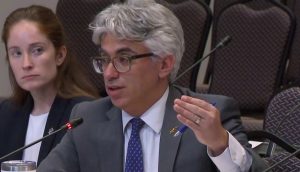The fourth time’s no charm for former CAB chief Glenn O’Farrell as the CRTC turned thumbs down, yet again, to selling ad time on US cable channels’ local avails to help end Canada’s broadcast woes.
As it did on three earlier occasions, the regulator on Thursday denied an application by Media de Novo for a licence to insert advertising in local availabilities and over ads on Canadian stations distributed from distant markets.
O’Farrell, now chairman and CEO of Toronto-based Media de Novo, pitched the regulator on the proposal last February to convert local avails on US services like A&E, CNN and MSNBC into Canadian commercials and revenue for local programming.
But the CRTC ruled O’Farrell and his team did not ‘provide sufficient benefits to warrant departure from the Commission’s current policy on local availabilities or that its service should be licensed as a category A programming service.’
‘The Commission’s policy is intended to ensure that local availabilities are used for the benefit of the Canadian broadcasting system and primarily to promote Canadian programming services rather than for the direct financial benefit of any party,’ the ruling continued.
O’Farrell expressed disappointment with the CRTC decision on what he regarded as a ‘very innovative and beneficial proposal for the Canadian broadcasting system overall.’
At the same time, O’Farrell said he took comfort that the CRTC in its decision directed Media de Novo to negotiate directly with the cablers and satellite TV operators on its own terms.
‘…In the event the Commission were to change its policy regarding the sale of commercial advertising for insertion in local availabilities in the future, nothing would preclude Media de Novo from offering its services as an aggregator of advertising material to Canadian BDUs that might wish to insert commercial advertising in local availabilities under any such new policy,’ the CRTC noted.
O’Farrell said his company was quite willing to meet BDUs half-way.
‘We are actively considering those options and working on that because, at the end of the day, we all know Canada needs a targeted ad solution and we think it best that it be developed in Canada by Canadian players, and that’s why we remain very interested in pursuing discussions and evaluating our options going forward,’ he told Playback Daily.
Those discussions could prove difficult, however, as the Media de Novo application apparently failed to secure much-needed support from Canadian broadcasters and cable giants.
Canadian advertisers, media buyers and indie producers got behind the Media de Novo bid, the CRTC reported, but it was opposed by BDUs, and Canadian and US programming services.
Canadian broadcasters opposed the earlier three bids as well, this time insisting that to introduce new advertising inventory into the English-language Canadian TV market during an industry-wide ad slump would hurt, rather than help struggling conventional networks.
‘[Broadcasters] stated that the new advertising inventory would not ‘grow the advertising pie,’ but would merely redistribute the advertising revenues currently available in the Canadian broadcasting system, thereby reducing the advertising revenues of Canadian broadcasters,’ the CRTC reported.
Cooperation from BDUs appears crucial to the success of Media de Novo’s business strategy.
In its licence application, the upstart company proposed to create a network operations centre to format, schedule and distribute TV programming to each BDU’s head-end system where the new commercials would be inserted.
Media de Novo also proposed in time connecting 150 insertion points country-wide, and eventually introducing direct-to-viewer targeted advertising through TV set-top boxes.
Despite the setback dealt by the CRTC, O’Farrell insisted he was committed to pacting with BDUs ‘on a going-forward basis to make good on a targeted advertising/local avail solution for Canada.’






















